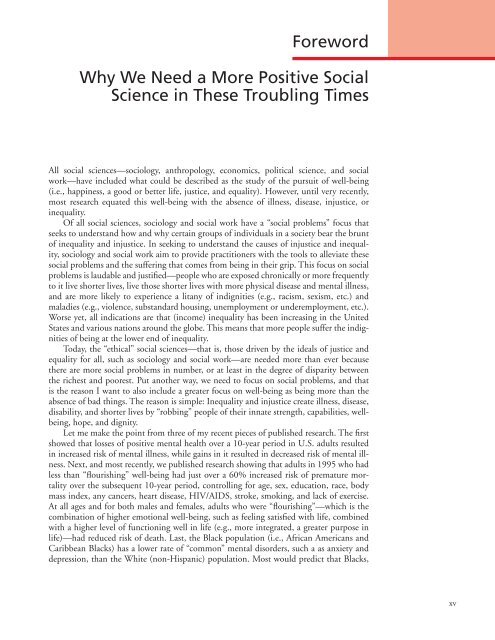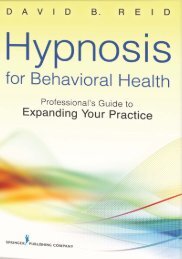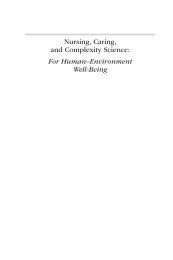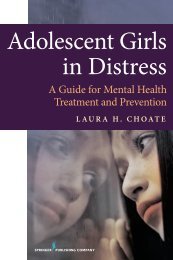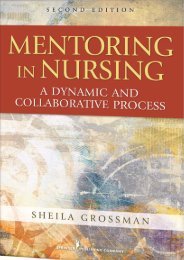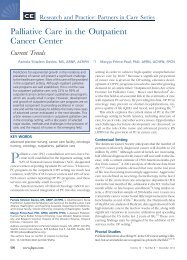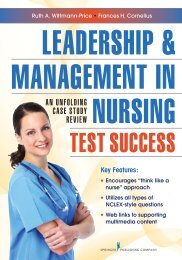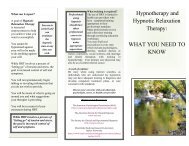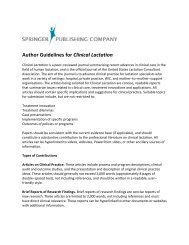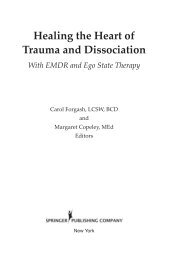Tools for Strengths-Based Assessment and Evaluation - Springer ...
Tools for Strengths-Based Assessment and Evaluation - Springer ...
Tools for Strengths-Based Assessment and Evaluation - Springer ...
Create successful ePaper yourself
Turn your PDF publications into a flip-book with our unique Google optimized e-Paper software.
Foreword<br />
Why We Need a More Positive Social<br />
Science in These Troubling Times<br />
All social sciences—sociology, anthropology, economics, political science, <strong>and</strong> social<br />
work—have included what could be described as the study of the pursuit of well-being<br />
(i.e., happiness, a good or better life, justice, <strong>and</strong> equality). However, until very recently,<br />
most research equated this well-being with the absence of illness, disease, injustice, or<br />
inequality.<br />
Of all social sciences, sociology <strong>and</strong> social work have a “social problems” focus that<br />
seeks to underst<strong>and</strong> how <strong>and</strong> why certain groups of individuals in a society bear the brunt<br />
of inequality <strong>and</strong> injustice. In seeking to underst<strong>and</strong> the causes of injustice <strong>and</strong> inequality,<br />
sociology <strong>and</strong> social work aim to provide practitioners with the tools to alleviate these<br />
social problems <strong>and</strong> the suffering that comes from being in their grip. This focus on social<br />
problems is laudable <strong>and</strong> justified—people who are exposed chronically or more frequently<br />
to it live shorter lives, live those shorter lives with more physical disease <strong>and</strong> mental illness,<br />
<strong>and</strong> are more likely to experience a litany of indignities (e.g., racism, sexism, etc.) <strong>and</strong><br />
maladies (e.g., violence, subst<strong>and</strong>ard housing, unemployment or underemployment, etc.).<br />
Worse yet, all indications are that (income) inequality has been increasing in the United<br />
States <strong>and</strong> various nations around the globe. This means that more people suffer the indignities<br />
of being at the lower end of inequality.<br />
Today, the “ethical” social sciences—that is, those driven by the ideals of justice <strong>and</strong><br />
equality <strong>for</strong> all, such as sociology <strong>and</strong> social work—are needed more than ever because<br />
there are more social problems in number, or at least in the degree of disparity between<br />
the richest <strong>and</strong> poorest. Put another way, we need to focus on social problems, <strong>and</strong> that<br />
is the reason I want to also include a greater focus on well-being as being more than the<br />
absence of bad things. The reason is simple: Inequality <strong>and</strong> injustice create illness, disease,<br />
disability, <strong>and</strong> shorter lives by “robbing” people of their innate strength, capabilities, wellbeing,<br />
hope, <strong>and</strong> dignity.<br />
Let me make the point from three of my recent pieces of published research. The first<br />
showed that losses of positive mental health over a 10-year period in U.S. adults resulted<br />
in increased risk of mental illness, while gains in it resulted in decreased risk of mental illness.<br />
Next, <strong>and</strong> most recently, we published research showing that adults in 1995 who had<br />
less than “flourishing” well-being had just over a 60% increased risk of premature mortality<br />
over the subsequent 10-year period, controlling <strong>for</strong> age, sex, education, race, body<br />
mass index, any cancers, heart disease, HIV/AIDS, stroke, smoking, <strong>and</strong> lack of exercise.<br />
At all ages <strong>and</strong> <strong>for</strong> both males <strong>and</strong> females, adults who were “flourishing”—which is the<br />
combination of higher emotional well-being, such as feeling satisfied with life, combined<br />
with a higher level of functioning well in life (e.g., more integrated, a greater purpose in<br />
life)—had reduced risk of death. Last, the Black population (i.e., African Americans <strong>and</strong><br />
Caribbean Blacks) has a lower rate of “common” mental disorders, such a as anxiety <strong>and</strong><br />
depression, than the White (non-Hispanic) population. Most would predict that Blacks,<br />
xv


